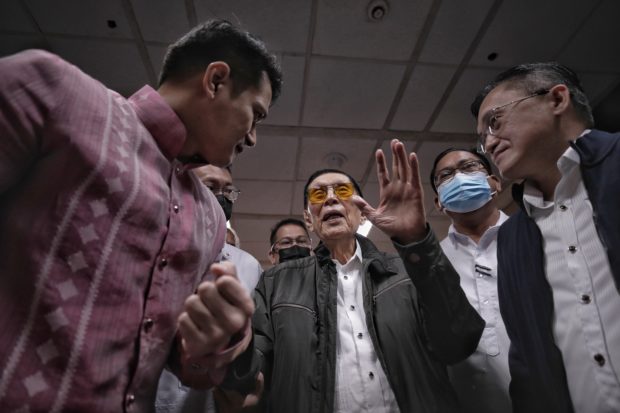
Chief Legal Counsel and former Senate President Juan Ponce Enrile returns to the Senate as a resource person of the Committee on Constitutional Amendments and Revision of Codes during the resumption of the hybrid public hearing on legislative measures calling for a review of the provisions of the 1987 Constitution Wednesday, September 21, 2022. (Voltaire F. Domingo/Joseph Vidal / Senate PRIB)
MANILA, Philippines – “Imminent danger” as a basis for martial law declaration should be restored in the Constitution, chief presidential legal counsel Juan Ponce Enrile said on Wednesday.
During the Senate committee hearing on constitutional amendments and revision of codes on Charter change proposals, Enrile claimed that then President Corazon Aquino intentionally removed the ground for martial law from the 1987 Constitution.
As the Constitution state, the president may declare martial law “for a period not exceeding 60 days in cases of rebellion and invasion, when public safety requires it.”
When Senator Robin Padilla, the panel’s chair, asked Enrile if he supports bringing back “imminent danger” as a justification for imposing iron rule, Enrile said yes.
“Sinadya iyan para humina ang kapangyarihan ng republika ng Pilipinas. Basta nahawakan nila iyong Saligang Batas na iyan, gusto nilang pahinahin sapagkat ang kanilang goal is to take over the power of the republic. Nothing more, nothing less,” Enrile said.
(They purposely wanted to take control over the Philippine Constitution, because their goal was to enfeeble and take over the power of the Republic of the Philippines. Nothing more, nothing less.)
He added that this showed what kind of leader Aquino was by eliminating one of the legal grounds for calling martial law.
“Ibig sabihin ni Cory, kung nandiyan na iyong giyera, binabaril na iyong mga sundalo natin at mga pulis, saka lang ako magdeklara ng martial law, hindi pwede iyon eh,” the former Senate President said.
(Only in times of war, when police and military are being targeted, is martial law justified, as Cory implied.)
Enrile later added: “Kapag nakita mo na … ang bansa mo ay namemeligro na sasalakayin o wawasakin ng insurekto o ng rebelyon, gumalaw ka na. Gamitin mo ang kamay na bakal para nang sa ganoon ay masugpo iyong problema na iyan at walang tao na masasamantala o mamamatay dahil tamad ka o takot ka na magdesisyon.”
(If you see that your country is in danger of invasion or of being destroyed by insurrection or rebellion, you should do something. You have to use your iron fist to stamp out these problems, and so that no person will die or be taken advantage of just because you were lazy or scared of making a decision.)
Defending Marcos’ martial law
A former justice minister of Ferdinand E. Marcos Sr., Enrile recalled martial law’s success in quashing communist insurgency during that time.
“Natakot sila. Parang bagyo na lumipas iyong movement ng mga [grupo] na iyan. Nahuli na lahat namin sila,” he said, then enumerating some names of those they caught during Marcos’ iron rule.
(They were scared. Since we caught all of those groups, the communist movement went by like a storm.)
Aquino, however, later freed the rebels they had captured.
Padilla asked Enrile why some people do not see the wisdom of declaring martial law then, especially those in prestigious schools. Enrile explained that the government was only working silently.
“Dahil hindi kami madaldal. Quiet lang kami noon. Akala nila sila na ang hari, pinabayaan lang namin. Kaya noong isang gabi, nag-operate kami. Hinuli namin lahat sila. Sinara namin ang buong Pilipinas. Kinontrol ko ang komunikasyon, pati iyong cable to reach out to the world. Lahat ng television stations sinequester ko,” he said.
(We weren’t noisy about it. We were just quiet. We let them reign over the country. But in one night, we conducted our operations. We caught them all. We shut down the entire Philippines and controlled all forms of communication. Also, I sequestered the TV stations.)
Enrile said even religious radio stations were shut down because the government “totally immobilized the entire country.”
Iron-fisted practices he cited before the panel included curfews and the confiscation of firearms.
Despite maintaining that the youth do not owe their freedom to martial law, Enrile expressed the belief that martial law preserved their individual freedom.
During Marcos’ iron rule, 11,103 people suffered human rights violations, based on Human Rights Violations Victims’ Memorial Commission data.
The figure covers only those whose compensation claims were approved by the Human Rights Act of 2013.
Amnesty International reported that between 1972 and 1981, 70,000 people were imprisoned, 3,257 were killed and 34,000 were tortured, while the Families of Involuntary Disappearances said 878 disappeared.